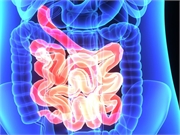74 percent of TAP cases had clinical features suggesting at least one CRC predisposition syndrome
FRIDAY, Feb. 21, 2020 (HealthDay News) — Childhood and young adulthood cancer (CYAC) therapy-associated polyposis (TAP) often has clinical features suggestive of at least one colorectal cancer (CRC) predisposition syndrome, according to a study published online Feb. 12 in Cancer Prevention Research.
Leah H. Biller, M.D., from the Dana-Farber Cancer Institute in Boston, and colleagues examined the phenotypic spectrum of TAP in a multi-institutional cohort. Cases, defined as patients with ≥10 gastrointestinal polyps without known causative germline alteration or hereditary CRC predisposition syndrome with prior treatment for CYAC, were identified from eight high-risk cancer centers.
Thirty-four TAP cases were included. The researchers found that gastrointestinal polyposis was first identified at a median of 27 years after CYAC treatment. Overall, 35 percent of TAP cases had ≥50 colorectal polyps; 94 percent had more than one histologic polyp type. Clinical features suggestive of at least one CRC predisposition syndrome were identified in 74 percent of cases, including 24 percent with features of multiple syndromes.
“TAP appears to be an acquired phenomenon that may mimic biologically distinct forms of inherited CRC predisposition syndromes; this raises the potential for misdiagnosis, with concomitant implications for both patient- and family-specific cancer screening recommendations,” the authors write.
Several authors disclosed financial ties to the biopharmaceutical industry.
Copyright © 2020 HealthDay. All rights reserved.








